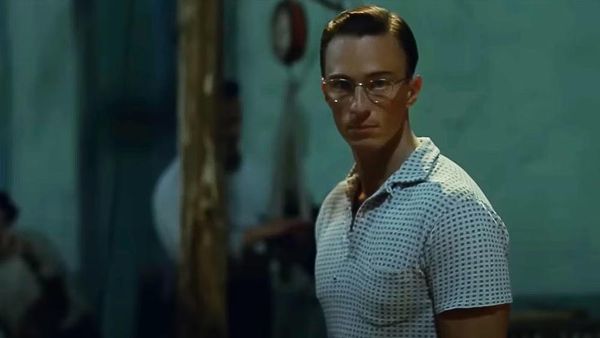July 12, 2007
John Kuntz on "Mr. Marmalade"
Kilian Melloy READ TIME: 9 MIN.
John Kuntz has amused Boston audiences for years, from his one-man shows (among them the award-winning "Starfuckers") to his roles in assorted holiday farces (his own – "My Life With The Kringle Kult," "Spiked Eggnog" – and others' – David Sedaris' "Santaland Diaries,") to his work as a founding member of the Actors' Shakespeare Project (including, recently, a star turn as Tamora in the troupe's hell-raising, all-male production of "Titus Andronicus."
Now Kuntz tackles a dark, disturbing, and dementedly funny role as the title character in Noah Haidel's "Mr. Marmalade." The character is the imaginary friend of a smart, highly articulate four-year-old named Lucy who, becoming furious with his ill manners, decides to spend quality time with the suicidal five-year-old next door instead. Naturally, Mr. Marmalade's bad behavior – and his coke-fiend ways, and his assorted other vices – are reflections of Lucy's own experiences, and the suggestions of what she's had to endure are as chilling as the play is transgressively funny. (And you thought you had a screwed-up childhood?)
John Kuntz chatted with EDGE recently about his role in Mr., Marmalade, the joys of steady work, and the art of living like a pauper.
EDGE: Are you the same John Kuntz who wrote for "The Guiding Light"" and As The World Turns?" IMDB.com seems to think you are...
John Kuntz: No, there are two John Kuntzs in the world. I'm the actor one. I also write, but I didn't write for "Guiding Light." My doppelganger, John B. Kuntz, wrote for the daytime soaps. When I was first doing my one person show, way back in, like, 1996 or something, he was in Boston. It was so funny, he came and saw the show, and I met him afterwards. It's caused some confusion on that website.
EDGE: No kidding! That same entry not only lists writing credits for those shows, but it also credits several movie roles which I think you actually did.
John Kuntz: No, I don't think he's an actor at all. I was in a few movies, "Anathema" [for which Kuntz won the Best Actor Award from the Festival Du Cinema du Bruxelles], and "Red Right Hand," and a film called "All the Rage," and that's about the extent of my movie credits.
EDGE: But as a stage actor, you've gotten to be quite well known in Boston.
John Kuntz: Yeah, well, I've always wanted to stay and live here, so I've made it my quest. Everyone's always saying that you have to go to New York or Los Angeles if you want to be an actor, but I don't like Los Angeles, and I don't want to live in New York. I love New York, but I didn't know anyone there at the time, and I'm from here, and I want to be here; I love Boston and wanted to stay here. [Making a living as an actor in Boston] has become my raison d'etre.
EDGE: My impression is that you are an actor more or less full time, without having to work in an office or something between shows.
John Kuntz: Yeah, I did for awhile, and then I didn't need to, which is nice. I don't make a lot of money at all, but I don't spend a lot of money. Half my job is not spending money. I live very frugally; I've lived like a pauper for years and years and years.
I did children's theatre, and I did dinner theatre, I did whatever I could; I wrote shows for myself. When no one would cast me, I would cast myself in my own shows. I had a job in a box office, and did a lot of that stuff.
But now theatre has become my day job. Fairly recently, in the last five years, I've started teaching a lot, and it's been really great, really inspiring.
EDGE: What are you teaching? Acting? Writing?
John Kuntz: I teach both. I teach a little performance at Emerson, so I have the students write their own pieces. And at Boston Conservatory, I've taught Acting for Singers for three years, which is teaching opera performers how to act. And I've taught Acting at Suffolk University, but this year Boston Conservatory offered me a full time position, so I'm going to teach there full time.
EDGE: Does that feel good, or is it an overwhelming prospect that threatens to take your rootless nomadic existence and turn it into a grind?
John Kuntz: That's the good thing: I'll still be able to do all the plays that I want to do. It doesn't really change that, which is nice. It is weird being in one place for the whole time, but the workload is going to be easier in some ways, because when I was teaching at the three schools I was riding my bike back and forth between them, and on Sundays I had a class from ten until twelve at Emerson, and then I'd have a class at twelve at BoCo and I'd be trying to get over there in a thunderstorm on my bike, and then I'd have to get back to Emerson at four for another class... it was exhausting. Now I'm at BoCo, I don't have to do that. It's all at one place.
The wonderful thing about the conservatory is, I'm doing a play in November and it's okay; they really want you to be working in your field. I guess the theory is you get better – you have more to teach if you have more [professional experience] under your belt. I wish things could be like that at every school.
EDGE: Does being a writer become part of the interpretive process for you? Is writing a tool for you to get into the intentions of the author when you're working out how to portray a character?
John Kuntz: I can't speak for everyone, but for me they certainly key off each other. When you're writing a play, it helps to know what an actor does, how they approach a character, and that certainly informs how I write. And when I'm looking at a play, like looking at "Mr. Marmalade," and thinking about what [author] Noah Haidel was thinking about when he wrote the piece... I don't know that it helps acting wise, but it certainly does give you a window, a different perspective on how to approach [the material].
Writing is lonely, I find. You're alone in a room with your self and your thoughts and a [computer] screen, and acting is so collaborative, you're working with all these people and you're creating something together. I love putting those two things together.
EDGE: And you've written quite a lot; four one-man shows and eight plays.
John Kuntz: Yes, I think there's twelve altogether. I got into this kind of thing where I'd be done with one and I'd have to write another one, so I kept writing and writing and writing. Now I have all these plays, and I've reached the point where I'm thinking I should really go back and see what else I can do with these things, because a lot of them were produced in Boston once, and they ran for three weeks, and then they went away.
I should have been concentrating on getting my work to New York and other cities to get them produced outside of Boston, but instead I [always] just wrote another one to be produced here.
EDGE: Is play writing still something you're doing now, or do you pretty much stick to the acting?
John Kuntz: Well, I go back and forth, because when you're doing one, it's hard to do the other concurrently. Usually I'm either a playwright or an actor. I'm still thinking about things, but it's not like I'm sitting at my desk writing. And the other thing is that I'm normally thinking about going and finding the next job: when one job ends, it's time to go and find another job.
In the fall I'm going to be in another play, "Copenhagen," and I'm thrilled about it. It's an amazing play. I'm playing [physicist Werner] Heisenberg, and it's just such a huge role. It's going to be at the Loeb, and I've never been at that theater before; I'm, you know, petrified, and I want it to go well, so I'm focusing a lot of energy on that.
EDGE: And right now you've got a juicy role with "Mr. Marmalade."
John Kuntz: Yeah, it's a great play; it's so funny, so dark, and so disturbing. When I first read it, I'd never even heard of Noah Haidel before; I was like, "What is this play? It sounds kind of interesting." I just loved it; I was blown away by it. I remember when I read it, thinking I'd love to be in that play.
[When I was cast to play Mr. Marmalade], the weird thing was that they started rehearsals over a month ago, and I wasn't going to be here. I was in New York doing a play. I told them, "I won't be back until the end of June," and they were fine with that – they went on and rehearsed without me, and when I got back they sort of plugged me in.
The thing about it is that a character named Lucy, played by a wonderful actor named Rachel Hunt, is the main character. It's really about her. Even though I play Mr. Marmalade, I'm not in the play [that much]. I'm in about four major scenes. I'm on and off, because I'm her imaginary friend; no one else can see me.
EDGE: Michael C. Hall played that role in New York. Do you feel you need to look to his performance... or avoid looking at his performance?
John Kuntz: I always avoid looking at [interpretations] that other people have done. I don't want that in my brain, because one you get [those influences] in there, it's hard to get them out. I have no idea how Michael C. Hall performed ["Mr. Marmalade"]. I've seen pictures of the production, I kind of know what it looks like, but I have no idea how he played the part. That's a relief, in a way.
When I did "Richard III," I had never seen Laurence Olivier do it –�thank God – but I had seen Ian McKellen do it, and I then had to try and forget [McKellen's performance] once I got the role, which was tricky. You have to make [a role] your own, even if you've seen what [famous actors] do [with it]. There are other choices to be made, even though the ones they made may be great. That's the hard thing about doing a role that's really famous – others have left their stamp on it. It's up to you to find what's fresh about it.
EDGE: Mr. Marmalade is an imaginary friend to a four year old girl, but he's an unusual imaginary friend in that he has a cocaine habit, and he's bipolar. Reading the description of the play, I was thinking that this is like "Calvin & Hobbes," as written by Jim Carroll.
John Kuntz: Yeah, kind of. What's cool is that he's a figment of her own imagination, and you have to ask, "Why did she create a character who abuses her and treats her so horribly?" The things that he does are his choices, but ultimately they are her choices; it's fascinating, because she works through a lot of her problems through her relationship with Mr. Marmalade. You feel like a psychologist, working out these roles.
EDGE: Did you and Rachel Hunt workshop this together at all, or did you each go off and think about this and then see how well you meshed?
John Kuntz: Well, we did that in rehearsal; we'd come in, and I'd have ideas, and Rachel would have ideas; she'd help me see things, and we'd play with ideas. Definitely, we'd talk about what [Lucy's] reasons are. All we know is that her father is absent; he left her family when she was two, so in a way [Mr.Marmalade is] a stand-in for her father. We'd talk about that theory, but certainly the play has a lot of things up in the air, there's a lot that's ambiguous. [As Mr. Marmalade,] I know at my core that without her I'm nothing, so I want to please her; it's interesting, how the question of what to do with me is answered.
It's a very funny play, it's very dark. It's very different from "Persephone," which was Boston's introduction to Noah Haidel. I think that the people who saw "Persephone" would be interested in "Mr. Marmalade," and if you didn't see "Persephone," you should see this one. It's a very different sort of play.
What I love about it is that it's so theatrical; here you have adults playing children, and you have characters who can't be seen or heard by other people, who are imaginary; fantasy and reality are blending into each other; it's amazingly theatrical. I like my theatre to be theatrical. If a play is like a TV show on stage, I wonder why I'm not just watching a film. I think that's the exciting thing about theatre, that it's made for the stage: it belongs there, as a live performance for people to come and see and to have a relationship with a live actor.
Kilian Melloy serves as EDGE Media Network's Associate Arts Editor and Staff Contributor. His professional memberships include the National Lesbian & Gay Journalists Association, the Boston Online Film Critics Association, The Gay and Lesbian Entertainment Critics Association, and the Boston Theater Critics Association's Elliot Norton Awards Committee.






